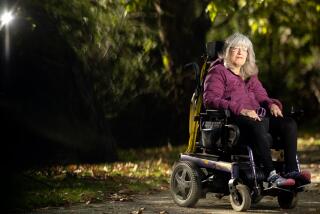Implant Suit Yields $10 Million
- Share via
WASHINGTON — A federal jury awarded $10 million Monday to a Washington lawyer who claimed that the silicone breast implants she received 21 years ago caused a serious disease that threatens to disable her permanently.
Brenda G. Meister contended that leaking implants caused her to develop scleroderma, a debilitating illness that affects connective tissue. Since she was diagnosed with the disease in 1987, a decade after she got the implants, numerous problems have developed, according to her doctor. Her skin has hardened, her fingers have swollen and calcium deposits the size of tennis balls have formed in her back and hips, causing her to walk with a limp.
The verdict against Bristol-Myers Squibb Co. goes against the tide of recent decisions in breast-implant cases, which have tilted in favor of manufacturers. Bristol-Myers hadn’t lost in nearly six years, prevailing in its last six jury cases. But the jury in U.S. District Court here was not swayed by the company’s arguments and found that Meister’s implants led to her disease.
“This should be a tremendous encouragement to women to keep fighting,” said Robert L. Weltchek, one of Meister’s attorneys.
James Conlon, an attorney for Bristol-Myers, called the verdict “an aberration” and said the company will ask Judge William B. Bryant to set it aside. He said the verdict is “very inconsistent with the state of the science.”
The award comes a month after a panel of scientists appointed by a federal judge in Alabama issued a well-publicized report finding no definite ties between the devices and numerous diseases. After the report came out, an official from Bristol-Myers declared, “Breast implants are safe.” Bryant did not permit the panel’s report, which came out during the trial, to be used as evidence.
The jury was persuaded by Meister’s doctor, who testified that he had concluded “with absolute certainty” that her implants led to scleroderma.
Meister, 56, who lives in Arlington, Va., declined comment on the verdict. Her implants were manufactured by Medical Engineering Corp., a firm based in Racine, Wis., that was acquired in 1982 by Bristol-Myers. Her lawsuit alleged that Medical Engineering made a defective and “unreasonably dangerous” product. It blamed Bristol-Myers for failing later to warn women adequately of potential hazards. According to her lawsuit, both companies intentionally deceived women by making false representations about the safety of implants.
The jury sided with Meister on each of those allegations. However, the panel--nine women and one man--rejected her bid to obtain millions more in punitive damages, saying she failed to prove malice or outrageous conduct.
Bristol-Myers, which stopped making implants in 1992, denied all of Meister’s charges on behalf of itself and Medical Engineering.
The trial included more than three weeks of conflicting testimony by medical specialists about long-standing claims that implants can cause diseases of the immune system, such as scleroderma, lupus and rheumatoid arthritis. Medical concerns led to a flurry of lawsuits against Bristol-Myers and other implant manufacturers in the late 1980s, some ending in large jury verdicts. The Food and Drug Administration temporarily pulled the devices from the market in 1992, demanding that makers demonstrate the silicone-gel implants were safe.
Since then, a series of studies--contested as biased or flawed by plaintiffs’ attorneys--has found no clear link between implants and classic diseases of the immune system, although none has ruled out a link to rare diseases or an atypical disease.
Several medical specialists testified for the defense, all finding no apparent dangers.
Meister’s attorneys, Weltchek and Stephen L. Snyder, countered with testimony from her doctor, a Washington rheumatologist. David G. Borenstein said he treated Meister for seven years, starting in 1987, before concluding her scleroderma could be traced to the implants. He said that Meister’s skin condition and difficulties with breathing improved after her implants were removed in 1991, signs to him that the devices caused her problems.
More to Read
Inside the business of entertainment
The Wide Shot brings you news, analysis and insights on everything from streaming wars to production — and what it all means for the future.
You may occasionally receive promotional content from the Los Angeles Times.










